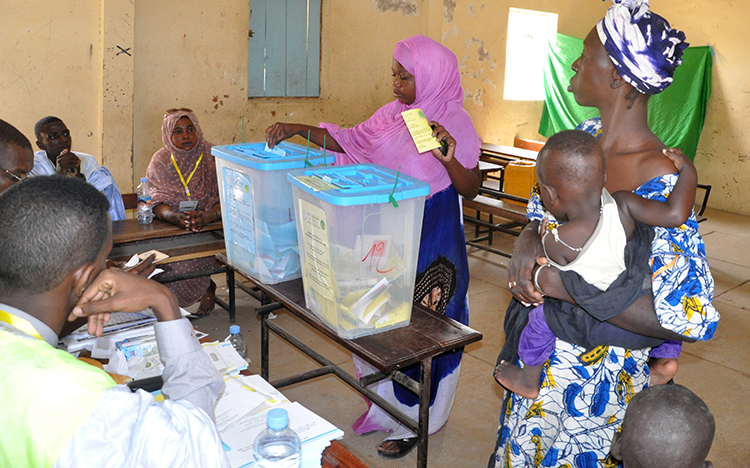The Mauritanian Radio and Television Broadcast Authority today ordered Mauritania’s five privately owned news stations to shut down for “failing to fulfil their financial agreements” with the country’s broadcast regulator, local media reported.
Local journalists with whom CPJ spoke said the move is the latest sign of a crackdown on the independent press, during unrest after President Mohamed Ould Abdelaziz called a referendum in August–which was boycotted by the opposition–to abolish the country’s Senate after it ruled against expanding presidential powers. In recent months, journalists have been attacked and detained while covering protests over the public referendum, which voted in favor of abolishing the Senate, and critical news outlets have faced legal action.
In the case of the privately owned stations, Mauritania’s regulator sent letters to Dava, Sahel TV, Chinguitt, al-Watania and Al-Mourabitoun TV saying that they had one day’s notice to pay all outstanding fees, or their broadcasts would be blocked, according to news reports. The order means only the state-run news channel is currently operating, according to reports.
At least one station was removed from air earlier. After the letters were sent to the stations yesterday, representatives from the tax authority went to the office of al-Mourabitoun TV, a channel that is generally supportive of the country’s opposition Islamist parties, ordered the employees to leave, and locked the doors, according to news reports. The agents told staff that the channel owed 2 million ouguiyas (US$5,600), in tax, according to the same reports.
Al-Mourabitoun TV, Dava, and Sahel did not immediately respond to CPJ’s requests for comment sent via email and social media. CPJ was unable to find contact information for Chinguitt and al-Watania.
The Mauritanian Supreme Press Authority did not immediately respond to CPJ’s email requesting comment.
Journalists covering protests over the referendum have also faced harassment. Ahmed al-Moustafa, a reporter at the local newspaper al-Akhbar told CPJ that he was harassed by police while filming an opposition protest in July. The journalist said that despite showing his press card, he was “dragged” into a police vehicle, where he was held for an hour. Al-Moustafa said that the police beat another journalist from al-Akhbar, whose identity al-Moustafa declined to disclose, while covering another protest, and held him for four hours.
Police also body-slammed and dragged Baba Ould Harma, a correspondent for Al-Jazeera while he was covering a protest in the capital, Nouakchott, Mohamed Ould Abdou, a blogger who photographed the incident, told CPJ.
“Photographers and video journalists were the primary target,” al-Moustafa said. “The police hold them in vans until the protests are over so they can’t obtain any footage.”
Mauritania’s National Gendarmerie, which governs the local police, did not immediately respond to CPJ’s emailed request for comment.
Separately, on August 25, police arrested four journalists–Moussa Sambasy, editor-in-chief of Le Quotidien de Nouakchott; Jedna Ould Deida, the director of news website Mauriweb; Babacar Baye Ndiaye, editor-in-chief of news website Cridem and his publisher Aminata Houdou, known as Rela Ba–and questioned them about their outlets’ funding and critical coverage of the arrest of opposition senator Mohamed Ould Ghadda, according to local news reports. They were released the same day. Police attempted to arrest Ahmed Ould Cheikh, editor-in-chief of the weekly Le Calame, but the journalist was out of the country at the time, according to news reports.
Sambasy, Baye Ndiaye, Ba, and Ould Cheikh are accused of allegedly accepting “bribes” from Mohamed Bouamatou, who is the president’s cousin and a vocal critic of the ruling party, and belonging to “an organized movement” to “disturb public order,” according to news reports. The journalists are under judicial supervision, which entails a regular check-in with prosecutors, a travel ban, asset freeze, and confiscation of passports, according to the same reports. No trial date has been set yet.
In a column that Ould Cheikh wrote for Le Calame in September, he described himself and his co-accused as “collateral victims” of the fight between the president and the opposition.
“The fight is crude,” he wrote. “The [case] file is so empty that any form of justice or independence does not seem possible.”
